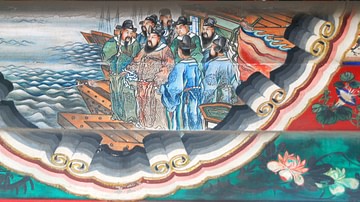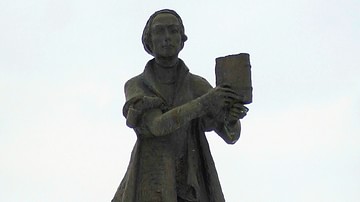Search
Search Results

Definition
John Wycliffe
John Wycliffe (l. 1330-1384, also John Wyclif) was an English theologian, priest, and scholar, recognized as a forerunner to the Protestant Reformation in Europe. Wycliffe condemned the practices of the medieval Church, citing many of the...

Article
Daily Life in Ancient China
Daily life in ancient China changed through the centuries but reflected the values of the presence of gods and one's ancestors in almost every time period. Villages like Banpo show evidence of a matriarchal society, where there was a priestly...

Article
The Difference Between the Mensheviks & Bolsheviks
The Mensheviks ('Minoritarians') and Bolsheviks ('Majoritarians') were two rival factions within the Russian Social Democratic Labour Party (RSDLP), also known as the Russian Social Democratic Workers' Party (RSDWP). The split occurred in...

Article
Six Great Heresies of the Middle Ages
The medieval Church established its monopoly over the spiritual life of Europeans in the Early Middle Ages (c. 476-1000) and consolidated that power throughout the High Middle Ages (1000-1300) and Late Middle Ages (1300-1500). Along the way...

Definition
Catherine the Great
Catherine II of Russia (Catherine the Great) was empress regent of Russia from 1762-1796. She was born in Prussia to Prince Christian August of Anhalt-Zerbst (1690-1747) and Princess Johanna Elisabeth of Holstein-Gottorp (1712-1760), and...

Definition
Russian Civil War - The Failed Fightback Against Bolshevism
The Russian Civil War (1917-22) began shortly after the Bolshevik Revolution of November 1917. The Bolsheviks (the Reds) immediately found themselves in conflict with various opposition forces who disagreed with Bolshevik policies like abolishing...

Definition
Drownings at Nantes
The Drownings at Nantes were a series of mass killings that took place in Nantes, France from November 1793 to February 1794 during the Reign of Terror. Overseen by Jean-Baptiste Carrier, the representative-on-mission from Paris, thousands...

Definition
Cao Cao
Cao Cao (c. 155-220 CE) was a military dictator in ancient China during the end of the Han dynasty. Something more than a mere warlord, Cao Cao supported a puppet emperor and governed a large area of northern China. His attempts to unify...

Definition
Argula von Grumbach
Argula von Grumbach (née von Stauff, l. 1490 to c. 1564) was a Bavarian theologian, writer, and reformer, who became a controversial figure after her 1523 letter To the University of Ingolstadt protesting the arrest of a young scholar for...

Definition
Pilgrimage of Grace
The Pilgrimage of Grace is the collective name for a series of rebellions in northern England, first in Lincolnshire and then in Yorkshire and elsewhere between October and December 1536 CE. Nobles, clergy, monks, and commoners united to...